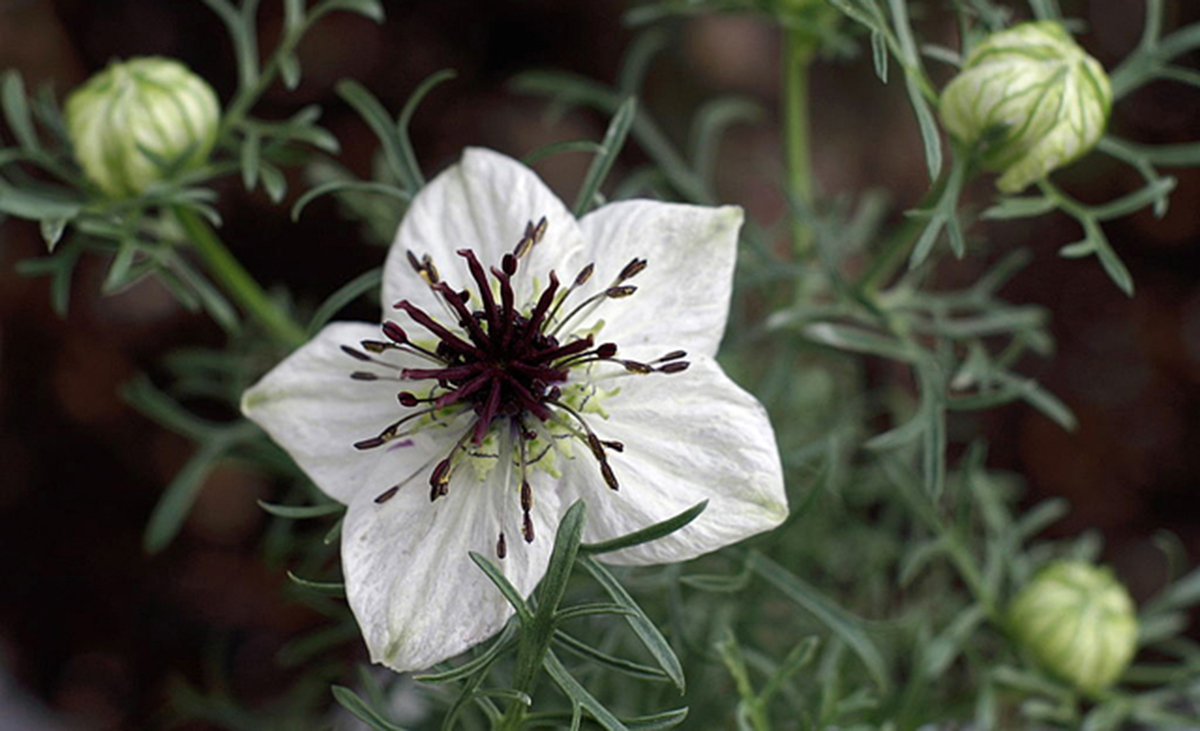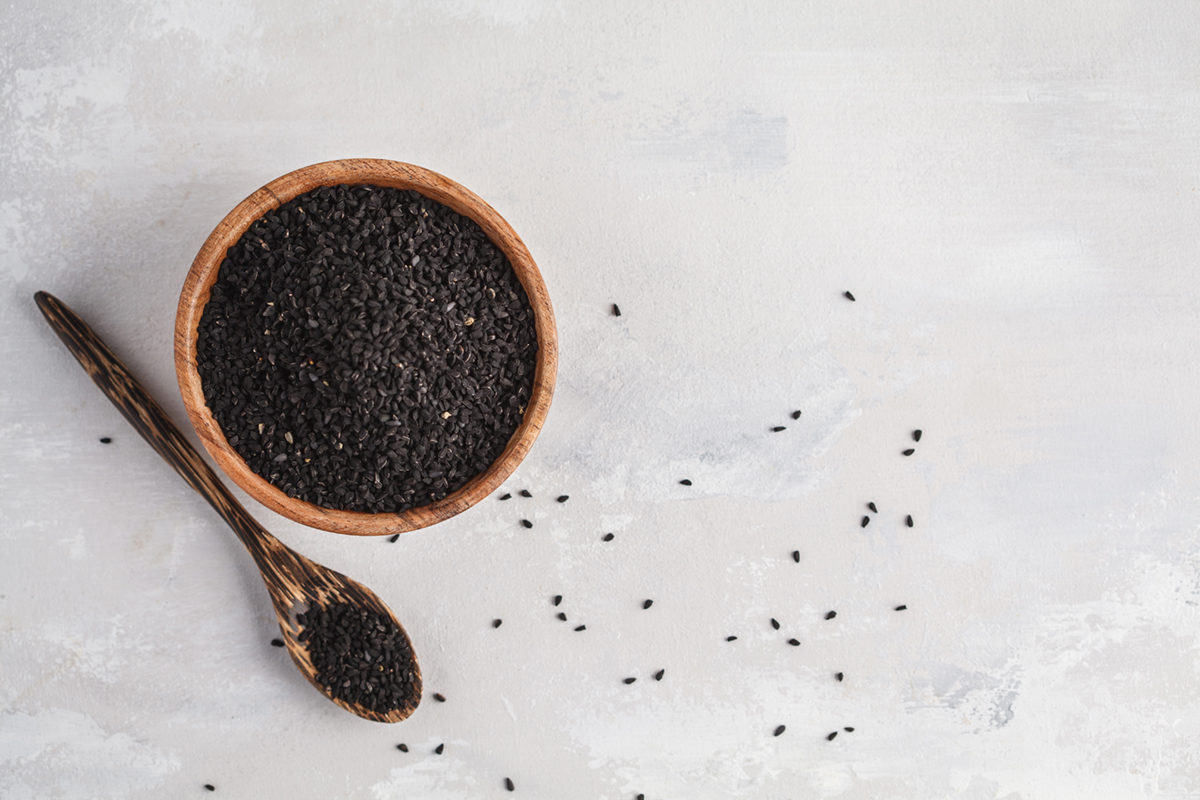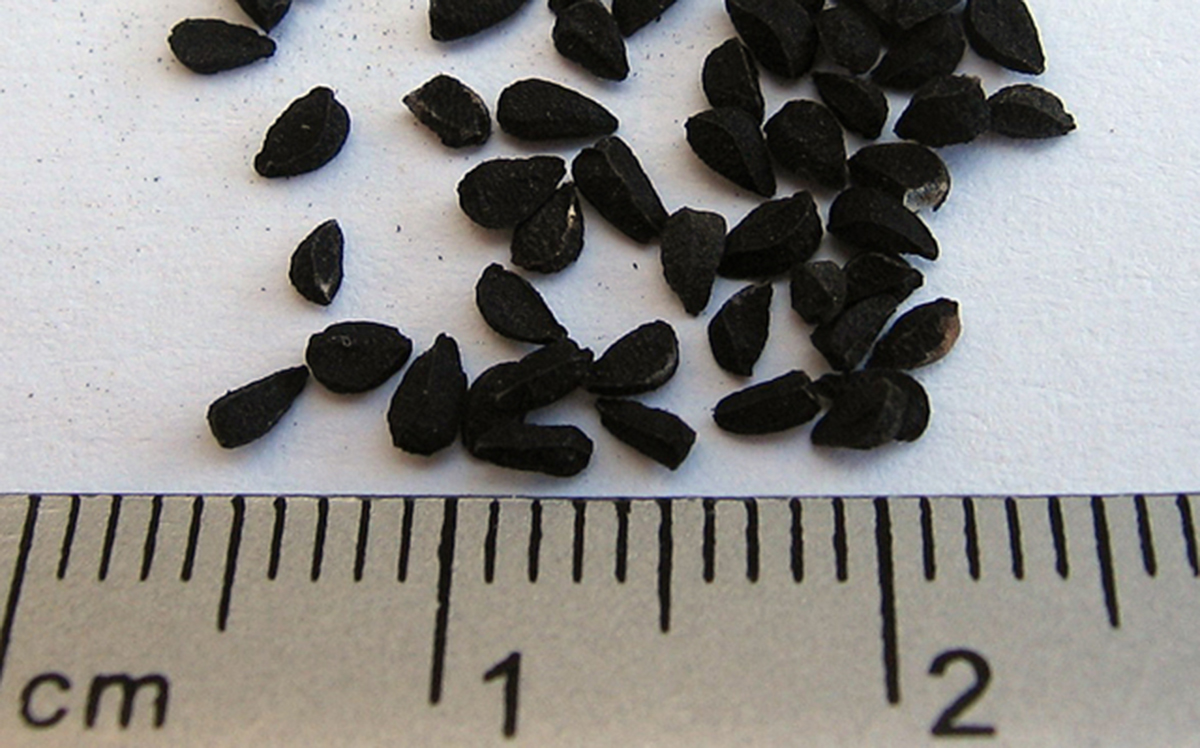The black seeds and oil extracted from Nigella sativa have been used to treat numerous diseases and adverse health conditions for centuries. It’s effectiveness as an anti-cancer treatment is backed by scientific research and clinical trials. But what is Nigella sativa, and how does it fight cancer?
What is Nigella sativa?
Nigella sativa (see above) is a pretty plant in the ranunculaceae family that has delicate pale blue and white flowers, feathery green foliage, and black capsule-like fruit pods that contain numerous small black seeds. These seeds, which resemble black onion seed, are used in Middle Eastern cooking and sometimes as an Indian spice, either fresh or dry-roasted. They are also often used in spice mixtures, including the Bengali five-spice mix known as panchphoron, together with cumin, fennel, fenugreek and mustard seeds.
It grows wild in India and is cultivated in several parts of the world, including Egypt and parts of the Middle East. Mature plants grow to about a foot (300 mm) in height.

Nigella sativa has a number of common names in various languages including English:
- Black cumin
- Black caraway
- Black onion seed
- Black sesame
- Nigella
- Roman coriander
- Fennel flower
- Nutmeg flower
- Kalonji (India)
- Jah-davels (Middle East)
These common names are extremely confusing, because Nigella sativa is not related to any of these better known spices.

Like Nigella sativa, the seeds of black cumin are used for culinary purposes and they also have therapeutic properties, working as a stimulant and a carminative (to prevent and combat flatulence.) The plant itself is used to aid the healing of wounds, and it is said to prevent obesity if used continuously. Like Nigella sativa, Bunium persicum is also valued for its oil, which has many different uses. The root is said to taste like chestnuts once cooked.
The cumin most of us are familiar with is different too, and belongs to the umbelliferae family. Indigenous to Egypt, Cuminum cyminum, which I cook with all the time, is now grown all over the world, mostly for its seeds. It’s a must for a good, traditional Indian curry. The essential oil from Cuminum cyminum is sometimes added to massage oil to help cellulite problems.
READ Risks factors for oesophageal cancer
Medicinal Uses of Nigella sativa
The medicinal uses of Nigella sativa are legendary, and in some societies it is considered to be a “cure all.”
For instance, in India it is used to repel lice from clothing, and it is eaten to get rid of worms and cure nerve problems. It is also said to reduce flatulence, induce sweating, and stimulate mothers’ milk, as well as to help with asthma, rheumatism, immune disorders, allergies, headaches and more severe migraines, colds and fever, headaches, peptic ulcers, and chronic active gastritis. It has been found to have strong antibacterial and antifungal qualities, and is also valued for its antioxidant activity. More incredibly, researchers have found that it can help those with diabetes, epilepsy, leukemia, damage caused by heart attack, and various types of cancer.
Scientific Research Confirms That Black Seed Oil Fights Cancer
Researchers have found that black seed oil slows down and even stops the activity of cancer cells, and that it effectively kills some types of cancer cells.
There are a number of active compounds in black Nigella sativa seeds (see above) and the oil that is extracted from them. In particular, thymoquinone (TQ) has been found to have anti-inflammatory, anti-oxidant, and anti-cancer properties, and alpha-hederin has been identified as a possible anticancer agent.
Results of a study on colon cancer undertaken at Tanta University in Egypt using rats was published by the US National Institutes of Health (NIH) on the PubMed web site in 2003. The findings showed that black seed oil could inhibit colon cancer without adverse side effects.

In the same year, PubMed published the findings of a US human study that used extracts from Nigella sativa as an oxidative stressor against breast cancer cells and found it to be effective in “inactivating” these cells.
US researchers from the University of Texas considered the potential of a number of phytochemicals from various spices to prevent cancer and other diseases. Specifically:
- Anethole found in fennel
- Capsaicin from red chillies
- Curcumin from turmeric
- Diosgenin from fenugreek
- Eugenol from cloves
- Gambogic acid from kokum
- Thymoguinone (TQ) from so-called "black cumin"
- Zerumbone from ginger
They found that phytochemicals derived from spices can mediate cancer. In terms of Nigella sativa, they found that TQ inhibits both tumor growth and tumor angiogenesis (when new blood vessels are formed) and could therefore be a “potential drug candidate” for treating cancer.
A Saudi Arabian human study published in The Saudi Journal of Gastroenterology in 2010 looked at the efficacy of Nigella sativa in eradicating Helicobacter pylori infection that leads to a number of disorders including gastric cancer. Whilst the group of patients given triple therapy (TT) that comprised three drugs, amoxicillin, clarithromycin, and Omeprazole (OM) had 82.6 percent success, the other groups treated with Nigella sativa and varying quantities of OM experienced eradication rates from 47.6 to 66.7 percent. This indicated that the black seeds have “clinically useful” activity against H. pylori infection that is comparable to accepted triple therapy that is currently used.
One of the reasons for this particular research study was that H. pylori had become more and more resistant to antibiotics. The researchers concluded that used with a single antibiotic Nigella sativa could provide a less expensive, relatively safer therapy for this widespread infection that leads to so many diseases.
Since Nigella sativa is known to have very potent antioxidant effects, and some drugs used to fight cancer (cyclophosphamide CTX for example) are highly toxic, researchers from King Saud University in Saudi Arabia used rats to see how effective black seed oil and TQ were in reducing toxicity from CTX. They concluded that there was potential for it to be used clinically to minimize the toxic effects of anticancer drug therapy.
Results of yet another Saudi Arabian study, this time published in the Asian Pacific Journal of Tropical Biomedicine in 2013, called Nigella sativa a “miracle herb” and found it to have amazing medicinal effects in fighting a number of diseases, including cancer. They studied the effects of the plant, specifically the TQ on a number of different types of cancer including cervical, breast and pancreatic cancer, and stated that its use with chemotherapeutic agents currently in use could result in safer drugs for the treatment of cancer.
READ Are Colorectal Polyps Cancerous?
And these are just a few examples.
The Anticancer Activities of Black Seed Oil and TQ
Award winning researcher from the University of Macau in China, biochemist Md. Asaduzzaman Khan sums up the case for Nigella sativa and black seed oil in an article published in the African Journal of Traditional, Complementary and Alternative Medicines (AJTCAM.) Titled Anticancer Activities of Nigella Sativa (Black Cumin), he lists 57 references published between 1991 and 2010, and explains its role as an anticancer treatment. These include therapy used to fight:
- Blood cancer (leukemia)
- Skin cancer
- Pancreatic canceer
- Lung cancer
- Prostate cancer
- Breast cancer
- Cervical cancer
- Colon cancer
- Hepatic cancer
- Renal cancer
- Fibrosarcoma
While the fact that black seed oil has been recognized by traditional medicine as an anticancer therapy for thousands of years, scientific research, he says is only relatively recent. Further, there is not yet adequate understanding on how it works and the chemical composition of the seeds and oils has not been adequately authenticated. The molecular mechanism of TQ has also not been fully investigated.
Backing a broad believe that traditional medicine offers a “promising source” for new therapy against cancer, Khan believes that extensive research is needed and that this might contribute to “the discovery of new anticancer strategies.” This would be good news indeed.
- The complete book of SPICES A practical guide and directory to over 40 spices by Ellen Freke. Quintet Publishing Limited, London 1997
- Essential Oil Consituents of Zira (Bunium persicum [Boiss.] B. Fedtsch.) from Tajikistan by Farukh S. Sharapov et al. AkiNik Publications, Tajikistan 2015 http://www.essencejournal.com/vol2/issue3/pdf/2-3-8.11.pdf
- Kala zeera ( Bioss.): a Kashmirian high value crop by Parvaze A Sofi, Nazeer A Zeerak & Parmeet Singh. TÜBÌTAK, India 2009 http://journals.tubitak.gov.tr/biology/issues/biy-09-33-3/biy-33-3-10-0803-18.pdf
- gernot-katzers-spice-pages.com/engl/Buni_per.html
- www.bioline.org.br/pdf?md08011
- A review on therapeutic potential of Nigella sativa: A miracle herb http://www.ncbi.nlm.nih.gov/pmc/articles/PMC3642442/ Chemopreventive potential of volatile oil from black cumin (Nigella sativa L.) seeds against rat colon carcinogenesis. http://www.ncbi.nlm.nih.gov/pubmed/12881014
- Effect of Nigella sativa (N. sativa L.) and oxidative stress on the survival pattern of MCF-7 breast cancer cells. http://www.ncbi.nlm.nih.gov/pubmed/12724920
- Comparative Study of Nigella sativa and Triple Therapy in Eradication of Helicobacter pylori in Patients with Non-Ulcer Dyspepsia http://www.ncbi.nlm.nih.gov/pmc/articles/PMC3003218/
- Anticancer Activities of Nigella Sativa (Black Cumin) http://www.ncbi.nlm.nih.gov/pmc/articles/PMC3252704/
- www.researchgate.net/profile/Md_Asaduzzaman_Khan
- Potential of spice-derived phytochemicals for cancer prevention https://www.thieme-connect.com/products/ejournals/html/10.1055/s-2008-1074578
- Protective effects of Nigella sativa oil and thymoquinone against toxicity induced by the anticancer drug cyclophosphamide. http://www.ncbi.nlm.nih.gov/pubmed/20373678
- Thymoquinone: potential cure for inflammatory disorders and cancer http://www.ncbi.nlm.nih.gov/pubmed/22005518 http://healthimpactnews.com/2014/black-seed-oil-cures-many-cancers-according-to-numerous-studies/
- Photograph of Nigella sativa plant courtesy of K Yamada/Wikimedia & Flickr https://www.flickr.com/photos/yamada/490301983
- Photograph of Nigella sativa seeds courtesy of TheGoblin/Wikipedia https://upload.wikimedia.org/wikipedia/commons/6/6a/Nigella_Sativa_Seed.jpg
- Photograph of Bunium persicum courtesy of TÜBÌTAK, Indian Division of Plant Breeding & Genetics http://journals.tubitak.gov.tr/biology/issues/biy-09-33-3/biy-33-3-10-0803-18.pdf
- Photo courtesy of
- Photo courtesy of
- Important notification about information and brand names http://www.steadyhealth.com/polices/terms-of-use#copyright


Your thoughts on this